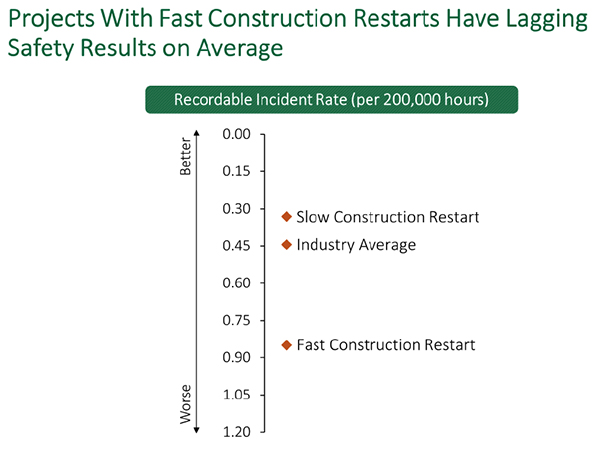Apr 23 | 2021
EPCs Must Select Best Restart Strategy for Each Project
Engineering, procurement and construction companies are being advised to not rush project restarts and to not bend to increasing pressure to deliver projects simply to strengthen market position and competitiveness.
Instead, Independent Project Analysis, or IPA, advises that project sponsors balance the risks associated with the remaining execution against forecast revenues, or other business justification for the project. EPCs also need to select the best restart strategy for each project.
 “Business and project teams too often overestimate their ability to mobilize and coordinate resources when restarting projects, for example, by not hiring enough safety mangers to keep pace with aggressive field mobilizations during fast construction restarts,” said Ronell Auld, IPA advanced associate project analyst.
“Business and project teams too often overestimate their ability to mobilize and coordinate resources when restarting projects, for example, by not hiring enough safety mangers to keep pace with aggressive field mobilizations during fast construction restarts,” said Ronell Auld, IPA advanced associate project analyst.
According to IPA surveys, companies slowed, stopped and canceled project work across their portfolios, reducing capital spend by 34 percent, on average, during 2020. Now, in 2021, companies are in search of successful strategies for restarting projects as the world enters the vaccination and post lockdown stage of the pandemic.
“Owner companies should be aware of the different risk profiles when restarting their capital projects. IPA research shows that outcomes differ considerably depending on the project lifecycle phase in which the stoppage occurs,” Auld said.
Projects stopped and restarted during the definition phase of the work process, before detailed engineering and construction, had similar outcomes to projects that never stopped and restarted, IPA found. In contrast, projects stopped and restarted after the definition phase averaged about 5 percent more cost growth than uninterrupted projects.
Moreover, IPA research found that projects stopped and restarted during the construction phase average significantly more cost growth than projects stopped and restarted during detailed engineering.
Instead, Independent Project Analysis, or IPA, advises that project sponsors balance the risks associated with the remaining execution against forecast revenues, or other business justification for the project. EPCs also need to select the best restart strategy for each project.
 “Business and project teams too often overestimate their ability to mobilize and coordinate resources when restarting projects, for example, by not hiring enough safety mangers to keep pace with aggressive field mobilizations during fast construction restarts,” said Ronell Auld, IPA advanced associate project analyst.
“Business and project teams too often overestimate their ability to mobilize and coordinate resources when restarting projects, for example, by not hiring enough safety mangers to keep pace with aggressive field mobilizations during fast construction restarts,” said Ronell Auld, IPA advanced associate project analyst.According to IPA surveys, companies slowed, stopped and canceled project work across their portfolios, reducing capital spend by 34 percent, on average, during 2020. Now, in 2021, companies are in search of successful strategies for restarting projects as the world enters the vaccination and post lockdown stage of the pandemic.
“Owner companies should be aware of the different risk profiles when restarting their capital projects. IPA research shows that outcomes differ considerably depending on the project lifecycle phase in which the stoppage occurs,” Auld said.
Projects stopped and restarted during the definition phase of the work process, before detailed engineering and construction, had similar outcomes to projects that never stopped and restarted, IPA found. In contrast, projects stopped and restarted after the definition phase averaged about 5 percent more cost growth than uninterrupted projects.
Moreover, IPA research found that projects stopped and restarted during the construction phase average significantly more cost growth than projects stopped and restarted during detailed engineering.




